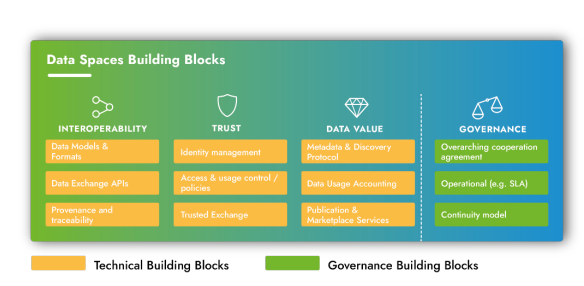
A data space is a development framework that enables the creation of a complete ecosystem by providing an organisational, regulatory, technical and governance structure with the objective of facilitating the reliable and secure exchange of different data assets for the common benefit of all actors involved and ensuring compliance with all applicable laws and regulations. Data spaces are also a key element of the European Union's new data strategy and an essential building block in realising the goal of the European single data market.
As part of this strategy, the EU is currently exploring the creation of several data space pilots in a number of strategic sectors and domains: health, industry, agriculture, finance, mobility, Green Pact, energy, public administration and skills. These data spaces offer great potential to help organisations improve decision-making, increase innovation, develop new products, services and business models, reduce costs and avoid duplication of efforts. However, creating a successful data space is not a trivial activity and requires first carefully analysing the use cases and then facing major business, legal, operational, functional, technological and governance challenges.
This is why, as a support measure, the Data Spaces Support Centre (DSSC) has also been created to provide guidance, tools and resources to organisations interested in creating or participating in new data spaces. One of the first resources developed by the DSSC was the Data Spaces Starter Kit, the final version of which has recently been published and which provides a basic initial guide to understanding the basic elements of a data space and how to deal with the different challenges that arise when building them. We review below some of the main guidelines and recommendations offered by this starter kit.
The value of data spaces and their business models
Data spaces can be a real alternative to current unidirectional platforms, generating business models based on network effects that respond to both the supply and demand of data. Among the different business model patterns existing in data spaces, we can find:
- Cost sharing: all participants save time and money by sharing data for a common purpose, such as the smart network of connected SCSN providers.
- Joint innovation: innovation is only possible if data is shared as none of the participants have the complete data individually, e.g., the Eona-X platform for mobility, transport and tourism.
- Combined forces: different actors join forces to prevent a single actor from dominating a certain space, as in the EuPro Gigant manufacturing data network.
- Shared market: actors with common interests share data with each other in order to benefit each other, such as the Catena-X automotive network.
- Greater common good: when the public and private sectors share data for a social purpose, as for example in the mobility data space developed in Spain through the Mobility Working Group of the Gaia-X Hub.
The legal aspects
The legal side of data spaces can be a major challenge as they necessarily move between multiple legal frameworks and regulations, both national and European. To address this challenge, the Data Spaces Support Centre proposes the elaboration of a reference framework composed of three main instruments:
- The cross-cutting legal frameworks that will apply to all data spaces, such as contract law, data protection, intellectual property, competition or cybersecurity laws.
- The organisational aspects to consider when establishing models and mechanisms for data governance in each specific case.
- The contractual dimension to be taken into account when exchanging data and the agreements and terms of use to be established to make this possible.
Operational activities
The design of operational activities should address the arrangements that enable the organisational functioning of the data space, such as guidelines for onboarding new participants, decision-making and conflict resolution.
In addition, consideration should also be given to business operations, such as process streamlining and automation, marketing tasks and awareness-raising activities, which are also important components of operational activities.
Functionality of data spaces
Data spaces shall share a number of basic components (or building blocks) that will provide the minimum functionality expected of them, including at least the following elements:
- Interoperability: data models and formats, data exchange interfaces and origin and traceability.
- Trust: identity management, access and usage control and secure data exchanges.
- Data value: metadata and location protocols, data usage accounting, publishing and commercial services.
- Governance: cooperation and service level agreements and continuity models.

While these components can be expected to be common to all data spaces and provide similar functionality, each individual data space can make its own design choices in implementing and realising them.
Technological aspects
Data spaces are designed to be technology agnostic, i.e., defined solely in terms of functionality and with freedom in the choice of specific technologies for implementation. In this scenario it will be important to establish clear references in terms of:
- A formal basis of de facto standards to be followed.
- Specifications to serve as a reference for the different implementations.
- Open source implementations of the basic components carried out by other actors.
Governance of data spaces
Designing, implementing and maintaining a data space requires multiple organisations to collaborate together across different functions. This requires these entities to build a common vision of the key aspects of such collaboration through a governance framework.
This will require a joint design exercise through which stakeholders formalise a set of agreements defining key strategic and operational aspects, such as legal issues, description of the network of participants, code of conduct, terms and conditions of use, data space incorporation and membership agreements, and governance model.
In the near future the DSSC support centre will identify the core components of each of the dimensions described above and provide additional guidance for each of them through the development of a common blueprint for data spaces. So, if you are considering participating in any of the data spaces initiatives that are being launched, but are not quite sure where to start, then this basic starter kit will certainly be a valuable resource in understanding the basic concepts - along with the glossary that explains all the related terminology. Also, don't forget to subscribe to the support centre's newsletter to keep up to date with all the latest news, documentation and support services on offer.
Content prepared by Carlos Iglesias, Open data Researcher and consultant, World Wide Web Foundation. The contents and views reflected in this publication are the sole responsibility of the author.